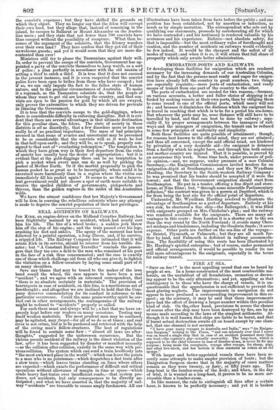EMIGRATION-PORTS AND RAILWAYS.
developing those facilities for emigration which are rendered necessary by the increasing demands of our Australian Colonies, and by the fact that the persons most ready and eager for emigra- tion have already left the country in great numbers, two things are especially requisite,—more ports of embarkation, and ready means of transit from one part of the country to the other. The ports of embarkation are needed for two reasons,—because, on various accounts, a better and fuller choice of shipping is af- forded by seeking vessels at their own ports, than by obliging them to come round to one of the official ports, which many will not do ; and because it diminishes the distance which the emigrant has to travel in reaching that which is to be for a period his sea-home. But wherever the ports may be, some distance will still have to be travelled by land, and that can best be done by railway; espe- cially if, by proper arrangements between the managers of rail- ways and the managers of emigration, the transit can be reduced to some few principles of uniformity and simplicity.
Both these facilities are quite possible of attainment; though, for reasons best known to the official mind, they are not attained; and thus all concerned, except the said official mind, are hindered by privation of a very desirable aid—the emigrant is debarred from a facility which he might have, and through him both colony and mother-country are injured. That it is possible, is proved by an occurrence this week. Some time back, under pressure of pub- lic opinion,—and, we suppose, under pressure of a new Colonial Secretary,—the Emigration Commissioners invited tenders for an emigration-depot at Southampton; and they saw Mr. Wyndham Harding, the Secretary to the South-western Railway Company : he was promised that his tender should be accepted if it were the lowest; and that the Government emigration should start from Southampton. He pat in a tender, offering a fine depot and store- house, at Nine Elms; but, "through some miserable Parliamentary influence," the contract was given to a person at Deptford, which is far from being the best site for the official point of departure. Undaunted, Mr. Wyndham Harding resolved to illustrate the advantage of Southampton as a port of departure. Entirely at his own risk, he chartered a fine ship—the Ballengeich ; it was filled with emigrants grouped on Mrs. Chisholm's plan ; and the railway was rendered available for the emigrants. There are many ad- vantages in this route: from London it is a shorter cut to the sea than the way round by the North Foreland; it avoids many. Chan- nel mishaps and hinclerances, including the Goodwin Sands ; it saves expense. Other ports are further on the sea-line of the voyage— as Bristol, Plymouth, or Falmouth; but they are all much fur- ther by land, and Falmouth is deficient in railway accommoda- tion. The feasibility of using this route has been illustrated by Mr. Harding's spirited enterprise ; but of course' under permanent and official arrangements, it would be possible to render its use still more advantageous to the emigrants, especially in the terms for railway transit.


























 Previous page
Previous page